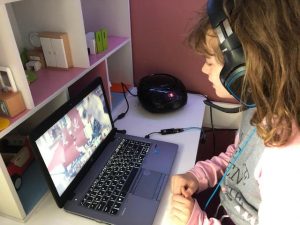Distance learning activities continue this summer for students across the country, and governments are expanding online learning programs and enhancing the supports offered to students, teachers, and parents.

Experiences gained in the delivery of online learning show that support must include personal and classroom technology, access to the information and communications infrastructure needed for online learning, but also supportive services at a human, interpersonal level.
Experiences gained in the delivery of online learning show that support must include personal and classroom technology, access to the information and communications infrastructure needed for online learning, but also supportive services at a human, interpersonal level.
While existing or legacy models for distance education have centred on the mechanisms of individual content delivery, assignment completion, and subject testing, newer approaches to online learning programs can emphasize a more caring-and-sharing approach, with more student-to-student and student-to-teacher interaction, as well as dedicated supports for students with special needs.
Despite the oft-repeated (and understandable) emphasis on specific computer technologies, software programs and applications available for online learning, it may be that improving rapport with online students will lead to greater improvements in academic success.
E-learning protocols can undercut a student’s engagement levels at both the secondary and post-secondary level, according to Rebecca A. Glazier, writing in the Journal of Political Science. Even if we are physically distant, we should make every attempt to maintain some kind of social nearness, connectivity, and sensitivity, according to her report, Education.Building Rapport to Improve Retention and Success in Online Classes.
Seeing technology as simply a platform rather than a participant can increase a useful focus on connection rather than curriculum. That may mean flexibility with assignment deadlines, course policies, even institutional policies. Personal routine as much as academic rigour is a positive outcome.
Even when technologically mediated, face-to-face relationships (are they screen-to-screen now?) between individuals in an online education environment can engender a sense of safety and community. Not only test results, but personal feelings should be shared without judgment as a way to lessen student stress and anxiety during these dangerous times.
In fact, as a group of academics, researchers and instructional designers remind us, well-planned online learning experiences are meaningfully different from courses offered online in response to a crisis or disaster. The scope and speed with which many educational institutions have had to develop online learning programs means those original strategies have to be enhanced, expanded or revised.
In Ontario, the government is working with non-profits, organizations, and businesses to identity supports — both technical and non — in their delivery of modern high-quality education experiences during the current school closure and efforts to stay on track to start the 2020-21 school year.
In one of its first steps to support families during the coronavirus pandemic, the government provided a one-time payment of $200 per child up to age 12 ($250 for children with special needs); while it was often described as a support for online learning or even buying a new computer, the payment was intended to help pay for the many extra costs associated with school closures, including the unavailability of daycare services.
So while technical support is obviously important for online learning, the government has launched the Ontario Together website where private enterprise and the non-profit sector can propose solutions to issues that are known to impede learning from home. As a result of those submissions, Ontario is moving forward with 34 partnerships with organizations and private businesses.
Several creative solutions for accessing learning and education resources have been accepted, but some partnerships focus on the health and well-being of students, parents, and teachers, such as:
- Start2Finish Canada: with virtual physical activity program available to all school boards, schools, teachers, parents, and students to support physical and mental health activities during COVID-19.
- Centre ontarien de prévention des agressions (COPA): online training and resources (available in English and French, some in Arabic, Mandarin, Spanish and Indigenous languages) about online safety, bullying prevention, mental health, and empathy.
Of course, part of the initiative is to get the needed technology for successful online learning into the hands of students otherwise facing challenges in getting their hands of the gadgets they need.
Among its announced initiatives and partnerships, the Ontario government says that various non-profits and consumer-facing companies have resourced available, including:
- Piicomm: up to 257 discounted Lenovo Chromebooks and laptops.
- HEXA: up to 100,000 discounted Chromebooks and 150,000 other tablets.
- Corporations for Community Connections (CFCC): up to 10,000 free used and refurbished HP laptops.
- We Are The Villagers: up to 35 discounted used and refurbished HP and Dell laptops.
Another tool needed for successful distance learning is direct support for the teachers on the front lines, and a new online resource for educators collects a number of technical and non-technical tips, suggestions, and advice for them, such as practice self-kindness, and take care of yourself.
Good advice for us all, at a distance or not.
-30-



